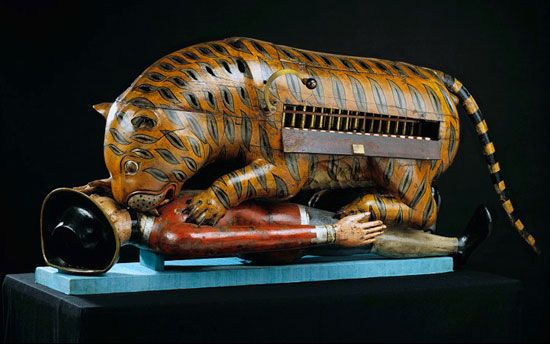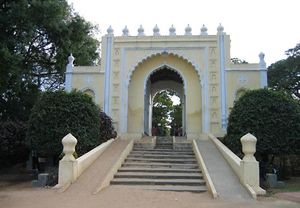Tipu Sultan
- Also called:
- Sultan Fateh Ali Sahab Tipu
- Byname:
- Tiger of Mysore
- Born:
- December 1, 1751, Devanhalli [now Bengaluru, India]
- Died:
- May 4, 1799, Seringapatam [now Srirangapatna] (aged 47)
- Title / Office:
- sultan (1782-1799), Karnataka
- Role In:
- Mysore War
- Mysore Wars
News •
Tipu Sultan (born December 1, 1751, Devanhalli [now Bengaluru, India]—died May 4, 1799, Seringapatam [now Srirangapatna]) was the sultan (king) of the Kingdom of Mysore, who reigned from December 1782 until his death in 1799. He is known for the four Anglo-Mysore Wars of the late 18th century in which he fought against Britain and its allies. There are differing theories on why Tipu is called the “Tiger of Mysore,” such as a legend that he killed a tiger with a dagger, his use of a tiger on his insignia, and the fact that he displayed exceptional war tactics and ferocity in battle, particularly against the British.
Early life
Tipu was born to Muslim military officer Hyder Ali, who later rose to become the ruler of the Mysore kingdom, ousting the Hindu Wadiyar rulers. Tipu’s mother, Fatima Fakhr-un-Nisa, was the daughter of the governor of Cuddapah (now Kadapa) in what is now Andhra Pradesh. Tipu’s birth date was earlier understood to be November 20, 1750, but in 2021 new evidence suggested that it was actually December 1, 1751. Tipu descended from the Quraysh people, who were the ruling tribe of Mecca. From a young age, he was instructed in military tactics by French officers in the employ of his father. He was also taught various subjects, including the Qurʾān, Islamic law, science, swordsmanship, horse riding, and languages such as Persian and Arabic. Scholarship aside, Tipu learned about power and politics from real-life experiences during his childhood. He watched Hyder Ali’s ascent to power and faced challenges, such as being imprisoned in a fort when he was about 10 years old when his father temporarily fled after his trusted minister Khande Rao betrayed him.
Tipu the warrior
Tipu fought wars alongside his father from a young age. In 1766 he got the chance to apply his military training in battle for the first time when he accompanied Hyder Ali in an invasion of the Malabar region (what is now Kerala). Tipu also took part in a campaign against the ruler of neighboring Balam, in which he forced the chief to surrender. His first encounter with the British East India Company was in the First Anglo-Mysore War (1767–69), in which Tipu fought with his father against the British and their allies. The war gave Tipu an opportunity to prove his mettle, as well as to hone his diplomatic skills, as he had to visit the Nizam of Hyderabad to negotiate terms for an alliance that would ensure that the Nizam did not side with the British during that war. This war ended with the Treaty of Madras, one clause of which stipulated that the British and Hyder Ali would support each other if either were attacked by a third party. In 1767 Tipu commanded a corps of cavalry against the Marathas in the Carnatic (Karnataka) region of western India, and he fought against the Marathas on several occasions between 1775 and 1779. During the Second Anglo-Mysore War (1780–84), he achieved a notable victory at the Battle of Pollilur in 1780 and defeated Col. John Brathwaite on the banks of the Kollidam (Coleroon) River (February 1782). His father was killed in battle during this war, and Tipu succeeded him in December 1782. In 1784 he concluded peace with the British with the Treaty of Mangalore and assumed the title of sultan of Mysore. In 1789, however, he provoked British invasion by attacking their ally, the raja of Travancore. Thus began the Third Anglo-Mysore War (1790–92). The war saw fierce battles, during which Tipu held the British at bay for more than two years; it culminated in the Treaty of Seringapatam (March 1792), which required Tipu to cede half his dominions, pay a huge indemnity, and give two of his sons to the British as hostages. Tipu remained restless and strengthened his ties with France when the French were able to convince him that their country’s post-Revolution government would be favorable to him. Unwisely, though, he allowed his negotiations with revolutionary France to become known to the British. On that pretext Richard Colley Wellesley, the governor of Madras (now Chennai) and governor-general of Bengal (both 1797–1805), launched the Fourth Anglo-Mysore War (1799). Seringapatam, Tipu’s capital, was stormed by British-led forces on May 4, 1799, and Tipu was killed leading his troops in the breach.
Tipu the ruler
Tipu was an able general and administrator. He introduced reforms such as a new land revenue system, a variety of new coins, and a calendar called the Mauludi calendar. His iron-cased rockets, known as Mysorean rockets, were a key innovation in warfare. Although Hyder Ali had also used these weapons, Tipu redesigned and used them to far greater effect. Made of metal tubes filled with gunpowder and a stabilizing rod, they later inspired the British Congreve rocket. Tipu wanted to expand his father’s dominion through aggressive conquests and was hostile toward neighbors, such as Cochin, Travancore, Coorg (now Kodagu), and Malabar. He took down those he considered rebels and is known to have been cruel toward his enemies. It is said that he lacked the judgment of Hyder Ali and, unlike him, forced non-Muslims among the Kodavas of Kodagu in modern Karnataka, the Nayars of Malabar in what is now Kerala, and the Christians of Mangalore (now Mangaluru) in Karnataka to adopt Islam. Experts have different views on the reason behind these forced conversions, some citing religious bigotry and others proposing pragmatic considerations related to consolidating Tipu’s kingdom. There is evidence, however, of Tipu’s religious tolerance. As the inam (gift) registers of Malabar show, he patronized Hindu temples with donations. He even exchanged many amicable letters, often referred to as the “Sringeri letters,” with the Shankaracharya (pontiff) of Sringeri mutt (religious monastery) and offered him help when needed.
Whether exalted as a king who fought to keep the British out of the country or condemned for his fundamentalism and aggression, Tipu was certainly the last formidable opposition that the British East India Company faced in India. His army was almost impregnable, and it took the combined forces of the British, the Marathas, and the Nizam to ultimately defeat the Tiger of Mysore.
Shatarupa Chaudhuri













